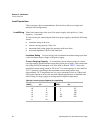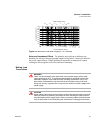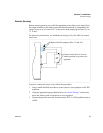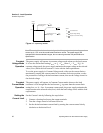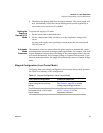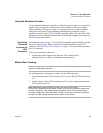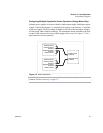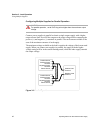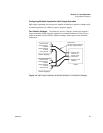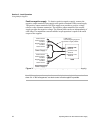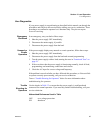Section 3. Local Operation
Using Over Voltage Protection (OVP)
38 Operating Manual for XPD Series Power Supply
Using Over Voltage Protection (OVP)
The OVP circuit protects the load in the event of a remote programming error, an
incorrect voltage control adjustment, or a power supply failure. The protection
circuit monitors the output voltage at the output of the power supply and will shut
down the main power converter whenever a preset voltage limit is exceeded. Set the
preset voltage limit (also called the setpoint or trip level) using the
screwdriver-adjustable front panel OVP ADJ potentiometer, or via one of the
optional GPIB or RS-232 programming interfaces.
Defining the
OVP Setpoint
1. Turn the power supply OFF.
2. Using a small, flat-blade screwdriver, turn the OVP ADJ potentiometer screw to
a fully clockwise position.
3. Turn the power supply ON. Set the output to the desired trip voltage.
4. Slowly turn the OVP ADJ potentiometer screw counter-clockwise until the red
OVP indicator lamp lights.
5. Push the power switch to OFF.
6. Turn the voltage control knob to minimum.
7. Push the power switch ON and increase the voltage to check that the power
supply shuts off the output at the set voltage.
8. Reset the OVP circuit after activation by removing the overvoltage condition
and turning the unit OFF and back ON, or, by momentarily activating the TTL
remote shutdown circuit. See “Using the Shutdown Function” on page 39, for
information about shutdown circuit operation.
OVP Circuit
Check
1. Turn power supply ON.
2. Adjust voltage to maximum. Adjust the front panel OVP ADJUST
potentiometer counter-clockwise.
3. The OVP LED will light up and the output of the power supply will drop to near
zero.
4. Rotate the front panel OVP ADJUST potentiometer fully clockwise.
5. Momentarily apply 5-15 V across J210 pins 1-2 (P1 -ve, P2 +ve) or cycle the AC
input power.
6. The power supply output will recover, indicating that the OVP circuit was reset
by momentarily activating the TTL S/D logic or cycling the AC power.



